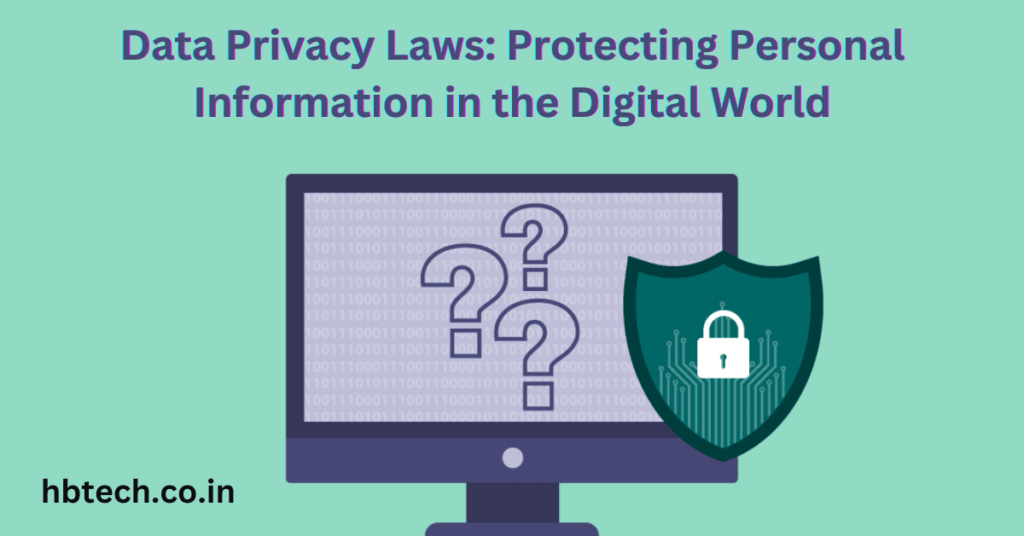In today’s digital world, our personal information is shared almost everywhere—whether we’re shopping online, using social media , or signing up for services. With so much data being collected, protecting it has become more important than ever. This is where data privacy laws come in. These laws are designed to ensure that companies handle our personal information responsibly. Let ’s explore what data privacy laws are, why they matter, and how they affect both individuals and businesses.
About Data Privacy Laws
Data privacy laws are rules that regulate how personal information is collected, used, and stored. Personal information includes anything that can identify you, like your name, email address , or phone number. The main purpose of these laws is to give people control over their data while ensuring that organizations protect it from misuse.
Different parts of the world have their own versions of these laws. For example;
- GDPR (General Data Protection Regulation) in Europe gives people strong rights over their personal data.
- CCPA (California Consumer Privacy Act) in the U.S. allows California residents to control how their data is collected and shared.
- India has its Digital Personal Data Protection Act to regulate the handling of personal information.
Why Are These Laws Important?
Data privacy laws are essential for several reasons:
- Protect Your Personal Data: They make sure that sensitive information, like financial or medical data, is kept safe from hackers and unauthorized use .
- Build Trust: When companies follow these laws, it shows customers that their data is being handled responsibly, which creates trust.
- Prevent Misuse: Data can be misused for scams, identity theft. or unwanted marketing. Privacy laws help stop these practices.
- Hold Companies Accountable: Businesses must follow these laws and face penalties if they don’t protect your data properly.
How Do These Laws Work?
Most data privacy laws focus on a few basic principles:
- Transparency: Companies must clearly explain what data they collect, why they need it, and how they will use it’
- Consent: Organizations must get your permission before collecting or using your data in most cases.
- Data Minimization: Only necessary data should be collected—nothing extra.
- Security: Companies must use strong protections to keep your data safe.
- Your Rights: Many laws give you the right to access your data, request corrections, or ask for it to be deleted.
Examples of Major Privacy Laws
Here are some well-known data privacy laws from around the world:
- GDPR (Europe):
- Applies to all EU citizens, even if their data is processed outside the EU.
- Gives people the right to know what data is collected about them, correct it , or delete it.
- Non-compliance can lead to huge fines.
- CCPA (California, U.S.):
- Lets Californians know what personal information is collected and if it ’s being sold.
- Allows people to opt out of having their data sold.
- Companies must provide a clear way for users to manage their data preferences.
- Digital Personal Data Protection Act (India):
- Regulates how data is collected and processed.
- Ensures transparency and accountability for businesses.
- Protects personal information from being misused.
How Do These Laws Affect Businesses?
Businesses that handle personal data must follow these laws to avoid penalties. Here’s what companies need to do;
- Use secure systems to protect data from breaches.
- Be transparent about their data policies and practices.
- Train employees to understand and follow data privacy rules.
- Regularly update their systems to stay compliant with new laws.
Ignoring these laws can lead to fines, lawsuits, and damage to a company ’s reputation.
What Can You Do to Protect Your Data?
While privacy laws are there to protect you, you can also take steps to keep your data safe:
- Be Careful with What You Share: Only provide personal information when it ’s absolutely necessary.
- Read Privacy Policies: Understand how a company will use your data before sharing it.
- Adjust Privacy Settings: Review the privacy settings on your social media accounts and apps.
- Use Trusted Websites: Stick to secure websites with proper privacy measures.
Next for Data Privacy
As technology evolves, new challenges around data privacy will arise. Emerging trends like artificial intelligence and smart devices mean that more personal data is being collected than ever. Governments around the world will likely introduce stricter privacy laws. and businesses will need to adopt even better practices to keep up.
Data privacy laws are there to protect our personal information in this digital age. They ensure that companies handle data responsibly, build trust, and give us control over how our information is used. While these laws are crucial , staying informed about your rights and practicing safe online habits will help you stay protected. Together, data privacy laws and individual responsibility make the internet a safer place for everyone.
Frequently Asked Questions(FAQs)
What are data privacy laws?
Data privacy laws are rules designed to protect personal information. They regulate how organizations collect, use, store, and share data, ensuring individuals have control over their private information.
Why are data privacy laws important?
These laws are crucial for safeguarding sensitive information, such as financial or health data. They also prevent data misuse, build trust between consumers and businesses, and hold organizations accountable for data protection.
What are some examples of personal data covered by these laws?
Personal data includes information like your name, email address, phone number, home address, financial details, and online browsing history.
Can you name some major data privacy laws?
GDPR (General Data Protection Regulation) in Europe.
CCPA (California Consumer Privacy Act) in the U.S.
Digital Personal Data Protection Act in India.
Each law has unique features but shares the common goal of protecting personal data.What rights do individuals have under data privacy laws?
Depending on the law, individuals may have the right to:
Access their personal data.
Correct inaccuracies in their data.
Request the deletion of their data.
Opt-out of having their data sold or shared.









